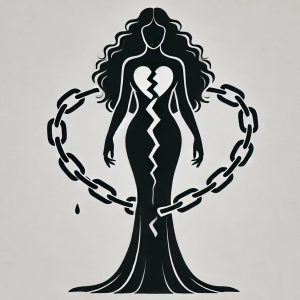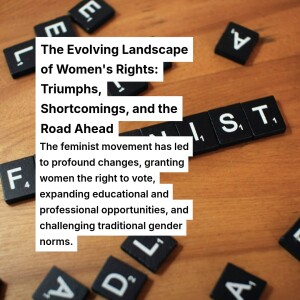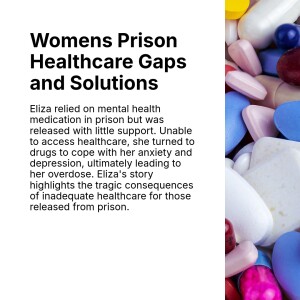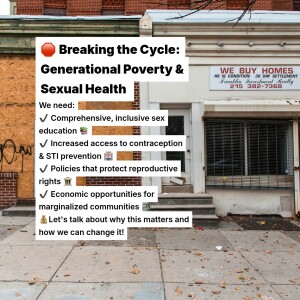Episodes

Sunday Apr 20, 2025
Sunday Apr 20, 2025
When we talk about mass incarceration in the United States, the conversation often centers around numbers—how many people are locked up, how long they’ve been there, and what it costs. But behind those numbers are real people, and among them are women whose specific health needs are often ignored, neglected, or misunderstood.
This post kicks off a six-part series examining equity in women’s health care within prisons and jails, inspired by the powerful work of researchers and advocates like Dr. Carolyn Sufrin and her co-authors. Their 2021 article, “Women’s Health Care in the Criminal Justice System,” exposes the critical gaps in how incarcerated women are treated—or not treated—when it comes to their health.

Monday Apr 14, 2025
Breaking The Trauma Bond of Anti Trafficking
Monday Apr 14, 2025
Monday Apr 14, 2025
A trauma bond is a strong emotional attachment that develops out of a cycle of abuse, reward, and intermittent validation. It’s often seen in abusive relationships, cults, and manipulative institutions. The bond forms not despite the harm, but because the harm is tangled up with moments of care, dependency, or survival.
In many anti-trafficking spaces today, survivors face a coercive script. They are often nudged—whether by advocates, funders, or media producers—to shape their stories around the most horrific, cinematic tropes: organized crime, foreign traffickers, violent pimps, and miraculous rescues. The system rewards extremity and punishes nuance. A survivor who says “I was trafficked by a boyfriend, but I also stayed because I loved him” or “I’ve also done sex work by choice” might be told their story is too complicated to use. But one who adapts their truth into a clean arc of innocence, exploitation, rescue, and redemption may find themselves invited to speak on panels, featured in documentaries, and funded as the “authentic voice.” The trauma becomes commodified, and the story becomes the legend.

Saturday Apr 05, 2025
Building the Trust Operating System: A Necessity for Success
Saturday Apr 05, 2025
Saturday Apr 05, 2025
In this episode, we delve into the vital role of trust in shaping our organizations and communities. Trust acts like the core operating system, influencing how effectively we organize, collaborate, and care for one another. When trust is low, costs increase, speed decreases, and relationships falter, leading to a systemic breakdown. However, high-trust environments foster speedier decision-making, creativity, and resilience, transforming potential into performance.We explore the real-world applications of trust, from support groups to non-profits, and illustrate how trust can be nurtured through consistency, transparency, and accountability. This episode emphasizes that building trust is a fundamental task—not just for survival, but for thriving. Learn how to integrate trust into your strategy to build empowering, secure, and sustainable systems.

Wednesday Feb 26, 2025
The Evolving Landscape of Women’s Rights
Wednesday Feb 26, 2025
Wednesday Feb 26, 2025
The feminist movement has led to profound changes, granting women the right to vote, expanding educational and professional opportunities, and challenging traditional gender norms. These victories, however, were not without their flaws—early efforts often excluded marginalized groups, leaving wage disparities, workplace harassment, and underrepresentation unaddressed. Rather than a failure, feminism and its reluctant willingness to evolve according to the politics and challenges that arise must be viewed as an ongoing struggle that adapts to societal changes while continuously striving for inclusivity.

Monday Feb 24, 2025
Healthcare in Womens Prisons - Gaps and Solutions
Monday Feb 24, 2025
Monday Feb 24, 2025
In recent decades, the issue of healthcare for incarcerated women has emerged as a critical area of concern. Although prisons and jails strive to provide essential medical services, significant gaps remain—especially during the transition back into society. Women behind bars face unique and complex health challenges that differ significantly from those encountered by their male counterparts, and these differences are compounded by a rapid increase in the female prison population.
The growth in the number of incarcerated women is not merely a reflection of rising crime rates; it is deeply intertwined with broader systemic issues. Harsh drug policies and mandatory minimum sentencing, particularly during the height of the "war on drugs," have disproportionately affected women, often resulting in lengthy sentences for minor drug offenses. Socioeconomic vulnerabilities, such as poverty, limited educational and employment opportunities, and histories of trauma and abuse, further increase their risk of entering the criminal justice system. Additionally, the lack of gender-responsive diversion programs and support services has left many women without viable alternatives to incarceration, while shifts in law enforcement practices have broadened the definitions of criminal activity and increased the scrutiny of minor offenses.

Friday Feb 21, 2025
Joey The Player Sentenced to the Max
Friday Feb 21, 2025
Friday Feb 21, 2025
On Wednesday, June 26th, 2024 #JoeyThePlayer, José Olivio Torres was sentenced to 30 years in prison for 4 counts of #SexTrafficking related charges, specifically “enticement” and “coercion” to cross state lines for the purposes of prostitution. No victims or survivors were arrested in the investigation or court proceedings of this case. He was brought to justice by sex workers who came forward and reported his violence to the FBI with the assistance of an attorney.

Tuesday Feb 18, 2025
The Intersection of Poverty, Environment and Sexual Health
Tuesday Feb 18, 2025
Tuesday Feb 18, 2025
Generational poverty and environmental issues are deeply intertwined, creating a cycle that perpetuates socioeconomic disparities. Environmental challenges, such as climate change and pollution, disproportionately affect impoverished communities, leading to adverse health outcomes, including compromised sexual and reproductive health. This intersection exacerbates existing inequalities and hinders efforts to break the cycle of poverty.
The intersection of environmental issues and generational poverty has been extensively studied. The Ballard Brief by Brigham Young University discusses how intergenerational poverty leads to unsafe living conditions and increased health risks, including exposure to environmental hazards. Additionally, the concept of environmental racism highlights how marginalized communities often face disproportionate exposure to environmental hazards, perpetuating cycles of poverty and health disparities.
Marginalized populations often reside in areas that are disproportionately affected by environmental hazards. These hazards include exposure to pollution, lack of access to clean water, poor air quality, and vulnerability to climate change-induced disasters such as floods, droughts, and extreme temperatures. Structural inequalities in housing, urban planning, and infrastructure exacerbate these issues, making it difficult for impoverished communities to access basic resources that support health and well-being.

Tuesday Feb 18, 2025
Generational Poverty Impact on Sexual Health
Tuesday Feb 18, 2025
Tuesday Feb 18, 2025
Generational poverty creates significant barriers to sexual health by limiting access to education, healthcare, and economic stability. Individuals born into poverty often face inadequate sex education, restricted access to contraception and reproductive healthcare, and higher rates of sexual exploitation and violence. Systemic inequalities, such as lack of affordable healthcare and stigmatization of marginalized communities, further contribute to higher rates of sexually transmitted infections, unplanned pregnancies, and poor overall reproductive health outcomes. Breaking this cycle requires comprehensive policy changes, community support, and increased access to resources that empower individuals to make informed decisions about their sexual well-being.




